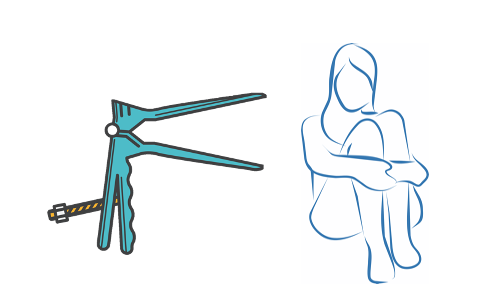
What is Vaginismus?

Do you experience pain or feel as if your vagina “closes up” during any sort of penetration? If you do, chances are you are dealing with vaginismus!
Q: What is vaginismus?
A: Vaginismus occurs when the muscles surrounding the vagina tighten involuntarily whenever there is any sort of penetration, be it a partner’s penis, a finger, a tampon, or even a speculum during a gynecological screening [1].
Women with vaginismus have no control over the tightness occurring, and may not even be aware that the muscles themselves are causing this tightness. Some women may experience burning, pain, or stinging during intercourse, while for others, penetration may be completely impossible, as if there is a “wall” closing off any sort of entry [2].
Unfortunately, many women, especially young women in their teens, 20s, and 30s, experience vaginismus at some point in their lives, even if they have previously enjoyed painless sex [1].
Q: Why does vaginismus occur?
A: It is not fully understood why the condition happens, but it is assumed that at least 2 in 1,000 women experience it at some point. This number is likely much higher because most women are too embarrassed to seek help, and even when they do, they are widely misdiagnosed and assume they will never be able to enjoy a sexual relationship [2].
For some women, vaginismus may be due to a traumatic past event, such as a difficult childbirth or sexual abuse. They may associate sexual activity with pain and avoid intercourse altogether [1]. Most also tend to think they are dealing with pain because their vagina is too small or abnormal. In reality, this is rarely the case, and vaginismus is the primary cause [2].
There are 2 main types of vaginismus [1,2]:
-
Primary vaginismus is when women have never been able to have sex because of the condition.
-
Secondary vaginismus is when women have previously been able to have pain-free sex but now find it difficult or impossible. Medical conditions like yeast infections, cancer, or thinning of the vaginal walls during menopause can all trigger vaginismus.

Q: If I believe I have vaginismus, how do I diagnose & treat it?
A: There is no simple medical test to diagnose vaginismus, but it can be done through multiple visits to a doctor or specialist. It will involve questions about the patient’s history, a description of the problem/ pain, and a gynecological examination to observe the muscle spasms and rule out any other condition and/ or infection [2].
The good news is that vaginismus is fully treatable, with most studies showing treatment success rates reaching close to 100%, allowing women to eventually experience pain-free sexual intercourse [2].
Treatment is focused on reducing the muscle reflexes and addressing any underlying fears or anxieties that may be present regarding penetration [3]:
-
Topical therapy: lidocaine or other compound creams can help with pain.
-
Pelvic floor physical therapy: a physical therapist can teach women how to relax their pelvic floor muscles.
-
Vaginal dilator therapy: vaginal dilators, which are tube-shaped devices that come in different sizes, can be used to stretch the vagina and help women become more comfortable with penetration.
-
Cognitive behavioral therapy (CBT): CBT can help those experiencing anxiety, depression, or post-traumatic stress disorder (PTSD) understand how their thoughts can affect their emotions and behaviors.
-
Sex therapy: trained sex therapists can work with individuals or couples to find pleasure again in their sexual relationships.
If you think you may be suffering from vaginismus based on your symptoms, you must be courageous and advocate for yourself until you receive a reliable diagnosis, as vaginismus is usually misdiagnosed or left unaddressed [2].
References:
1. Vaginismus [Internet]. Health Service Executive (HSE). 2011 [cited 1 February 2021]. Available from: https://www.hse.ie/eng/health/az/v/vaginismus/treating-vaginismus.html
2. Frequently Asked Questions [Internet]. Vaginismus.com. 2021 [cited 1 February 2021]. Available from: https://www.vaginismus.com/faq
3. Vaginismus: Diagnosis and Tests [Internet]. Cleveland Clinic. 2021 [cited 1 February 2021]. Available from: https://my.clevelandclinic.org/health/diseases/15723-vaginismus/diagnosis-and-tests
